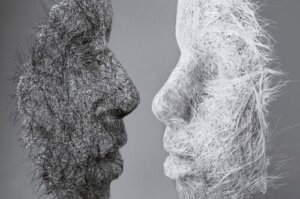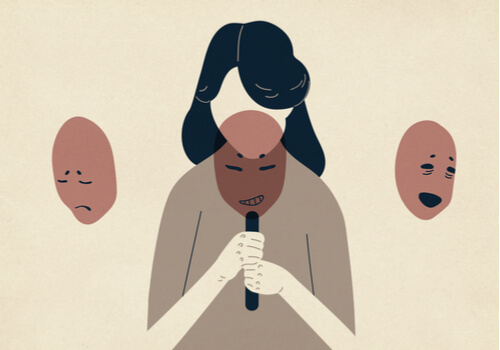Reaction Formation: An Amazing Defense Mechanism


Reviewed and approved by the psychologist Gema Sánchez Cuevas
Reaction formation is a defense mechanism. It occurs when someone experiences an instinctive or unconscious desire that they consciously reject. This leads them to develop the opposite impulse to the one they reject.
Let’s give an example. Say a woman doesn’t agree with her mother’s way of being, because she’s too controlling. This rejection leads her to incubate hatred for the way her mother tries to intervene and restrict her life. However, this hatred is actually repulsive to her, and, deep down, she feels that she’s a bad person for hating her mother. She consequently develops the behavior of reaction formation and goes out of her way to care for and please her mother.
“Reactive formation is a complex defense mechanism by which unacceptable feelings and impulses are modified to make them acceptable.”
-Robert Isaacson-
Obviously, this reaction formation mechanism is formed and takes place in the unconscious. The woman doesn’t realize that she’s developed it. She simply feels a strong impulse to act in that certain way. As a rule, exaggerated demonstrations betray this process.
Freud and reaction formation
Sigmund Freud was the first person to describe reaction formation. He included it in his classifications of obsessional neuroses. He claimed that reaction formation occurs when the subject fights against a painful unconscious desire and replaces it with a ‘primary defense symptom’, also called a ‘counter-symptom’.
One of the most representative examples, used by Freud, to refer to this mechanism is the neatness, scrupulousness, and modesty that many adolescents and adults develop. For the author, these are reactive formations that are in obvious contradiction with the desires of infantile sexuality in which the subject is submerged.
Therefore, reaction formation could be seen as a successful defense mechanism, insofar as the components involved in the conflict (the unconscious desire and the censored ‘reproach’) are globally expelled for the benefit of attitudes or behaviors that represent extreme moral virtues.
Reaction formation: overprotection and laxity
One of the most typical cases of reaction formation is the opposite of our first example. It occurs when a mother or father harbors resentments or hidden feelings of rejection for their children. However, every social mandate assures us that we must love our children unconditionally. For this reason, hostility toward children gives rise to unconscious feelings of guilt.
As a rule, in these cases, reaction formation gives rise to a strong need in the parents to overprotect their children. But, they’re really protecting them against their own feelings of hostility toward them. They fear that their rejection will hurt them. Therefore, overprotecting them is a way to avoid that damage, or to repair it. It gives rise to controlling parents who foster dependency in their children.

The opposite also happens. Unconscious feelings of guilt can give rise to limitless laxity. Basically, these parents let their children do what they want. They don’t set boundaries as they’re trying to compensate for the rejection they feel toward them. In the end, they encourage irresponsible attitudes and harmful behavior in their children. In fact, they turn them into demanding and dependent people.
Other cases of reaction formation
Other common cases of reaction formation occur in men labeled ‘macho’ or women misnamed ‘feminazis’. Sometimes, a man can’t tolerate their own fragility, because they’ve been taught that any show of sensitivity or tenderness will call their masculinity into question. Therefore, they become falsely tough and reckless, imposing unnecessary anguish and challenges on themselves. Something similar occurs with women who are hypersensitive to the slightest manifestation of masculinity.
There are also cases that go a little further. These are realities in which the defense mechanism is more intense and profound, giving rise to extremely rigid behaviors that become compulsive.
In these cases, ‘fanatical people’ appear. They feel strong sexual urges yet become the standard bearers of chastity. They might even lash out for having a ‘wet dream’. Or, they live their lives sacrificing themselves for others, to the extreme. They’re probably trying to get rid of unconscious feelings of guilt.
Types of reaction formation
Depending on the intensity of the compensatory behaviors and their importance, there are two types of reaction formation: localized and generalized.
Localized reaction formation
This kind occurs when the individual’s repressed desire isn’t central to the structure and functioning of their personality. Because of this, the reactive behavior they carry out isn’t usually too intrusive to their well-being. In addition, it tends to focus on one area of their life. Consequently, the more negative symptoms caused by this defense mechanism won’t appear too often.
Generalized reaction formation
This kind involves desires and behaviors that are much more central to the individual. In fact, people with generalized reaction formation unconsciously want to avoid one of their main desires. Therefore, the alternative behaviors they adopt are generally extremely rigid, and can even start to take over their lives. Unsurprisingly, they often lead to all sorts of problems.
Knowing each other well
We must stress that individuals aren’t aware of these processes. They don’t acknowledge the feelings or desires that they reject, nor do they realize that they’ve developed impulses to cover them up. They exhibit self-deception and unclear behavior toward others, but this isn’t deliberate.
Sometimes reaction formation occurs not only in one individual but in entire groups. For instance, families, ideological groups, work teams, etc. These environments often fuel guilt in the face of certain subjective realities. For example, they might idealize love and put it on a plane of perfection and not in human terms (imperfect). This favors the formation of reaction formation.

There are some cases in which reaction formation becomes a really strong obstacle to advance. In these instances, it’s imposed and can even affect the whole of the individual’s life. Moreover, it can become a risk to their physical and mental health. At that point, the only reasonable solution is psychotherapy. This promotes the emergence and appropriation of the unconscious contents of the mind.
Evidence of reaction formation
While not all defense mechanisms have withstood research scrutiny, many studies have provided compelling evidence for reaction formation.
- In a review on reaction formation, it was found that studies have demonstrated that people use reaction formation as a defense mechanism to defend the ego. This study revealed that, in research, when self-esteem was threatened, people responded by stating that they believed the opposite of their true feelings.
- In one study, women who experienced high levels of sexual guilt reported lower levels of arousal when exposed to erotic stimuli. Yet, physiological measures revealed that they were actually more aroused.
- One study found that when white participants were told that physiological records showed they held racist beliefs about black people, they gave more to a black beggar after leaving the lab than those who hadn’t been accused of racism.
- In another study, researchers found that, when there was a discrepancy between participants’ implicit and explicit sexual orientation, they were more likely to look down on those who identified as gay.
These studies allow us to observe how, in different situations, individuals support certain points of view while, unconsciously, feeling exactly the opposite.
Is reaction formation harmful?
This defense mechanism is a way of protecting ourselves from the anxiety and tension that the constant struggle between the id and the superego entails. Therefore, reaction formation doesn’t have to be considered something negative. However, it can cause all sorts of problems when used pathologically. Indeed, individuals who use it frequently, tend to adopt behaviors that are really harmful to their own psyche.
To treat this type of defense mechanism when it’s become a health problem, it’s best to work with a therapist. They’ll be able to identify it. Their aim would be to explore and accept the thoughts, desires, feelings, or impulses that caused the anxiety that led to the reaction formation in the first place. However, this can be a challenging and lengthy process.
Finally, reactive formation seeks to transform a feeling, an unacceptable or socially frowned upon idea into its opposite. The aim is to make it more acceptable to the demands of the superego. Therefore, it has an implicit regulatory function, like all ego defenses.
All cited sources were thoroughly reviewed by our team to ensure their quality, reliability, currency, and validity. The bibliography of this article was considered reliable and of academic or scientific accuracy.
- Baumeister, R. F., Dale, K., & Sommer, K. L. (1998). Freudian defense mechanisms and empirical findings in modern social psychology: Reaction formation, projection, displacement, undoing, isolation, sublimation, and denial. Journal of personality, 66(6), 1081-1124.
- Dutton, D. G., & Lake, R. A. (1973). Threat of own prejudice and reverse discrimination in interracial situations. Journal of Personality and Social Psychology, 28(1), 94.
- Fernández, L. (2018). Sigmund Freud. Praxis Filosófica, (46), 11-41.
- Morokoff, P. J. (1985). Effects of sex guilt, repression, sexual” arousability,” and sexual experience on female sexual arousal during erotica and fantasy. Journal of Personality and Social Psychology, 49(1), 177.
- Sierra, J. C., Ortega, V., & Zubeidat, I. (2003). Ansiedad, angustia y estrés: tres conceptos a diferenciar. Revista mal-estar e subjetividade, 3(1), 10-59.
- Weinstein, N., Ryan, W. S., DeHaan, C. R., Przybylski, A. K., Legate, N., & Ryan, R. M. (2012). Parental autonomy support and discrepancies between implicit and explicit sexual identities: Dynamics of self-acceptance and defense. Journal of Personality and Social Psychology, 102(4), 815.
This text is provided for informational purposes only and does not replace consultation with a professional. If in doubt, consult your specialist.








